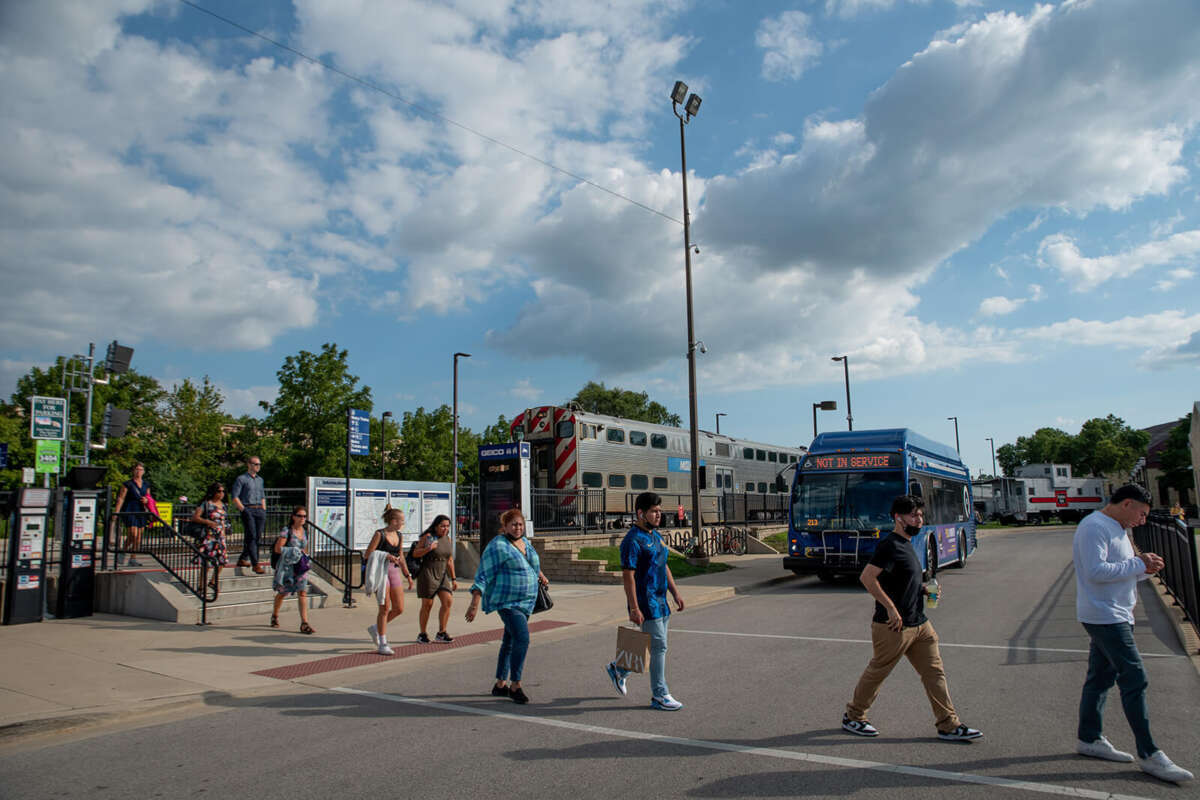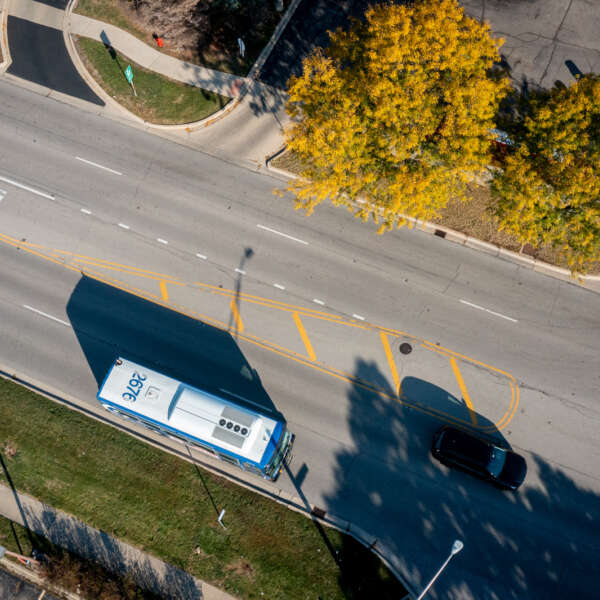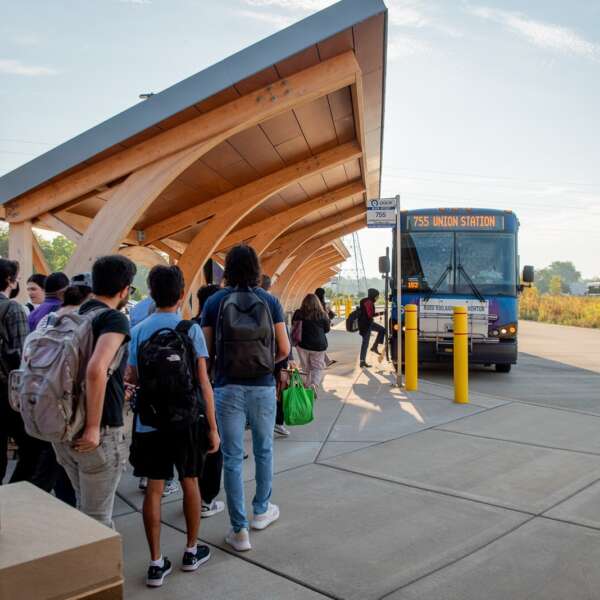RTA releases new fare equity report, recommending fully funding and expanding reduced fare programs
July 11, 2024
July 11, 2024

A new report released by the RTA in July, Building a More Equitable Fare Structure for Public Transit in the Chicago Region, recommends that the state legislature more adequately fund free and reduced fare transit programs to improve access to transit and, in doing so, shrink the system’s coming operating funding gap. The topic has been the subject of Transit is the Answer Coalition meetings and events over the last year where riders and advocates provided valuable input and feedback to inform the report, which was presented to the RTA Board of Directors in June. Read the full report online.
Public transit plays an invaluable role in the lives of millions of riders across the Chicago region and has the potential to reach even more people — but the system has been drastically underfunded for decades. The pandemic exposed what was already apparent: the system relies too heavily on fare revenue to balance operating budgets, limiting agencies’ ability to focus on delivering reliable service to the people who need it the most. More public funding is needed to support transit operations and maximize the system’s impact on the region’s economy, climate, and equity.
As a result of chronic underfunding and the growth of remote and hybrid work post-pandemic, starting in 2026 the system faces a projected budget gap equivalent to 20 percent of the region’s operating budget, estimated at more than $730 million annually and growing. Increased funding is required to fill the gap and maintain service levels, while additional funds beyond the fiscal cliff can realize expanded and improved transit service.
Even at its full base fares and pass prices, transit remains an affordable alternative to car ownership. Therefore, prioritizing transit availability and frequency of service along with free or lower priced base fares for qualifying riders is a priority for transportation equity in the region. While additional free and reduced fare programs have the potential to attract new riders, service reliability has a greater impact on ridership growth.
Chicago’s regional transit system gives hundreds of thousands of residents with disabilities and older adults independence through existing Americans with Disabilities Act (ADA) Paratransit and Reduced Fare and Ride Free programs. One critical step toward closing the coming budget gap is full funding for ADA Paratransit service and free and reduced fare programs for people experiencing low incomes, seniors, and people with disabilities. These critical and popular programs are severely underfunded, and adequate funding to cover their significant costs can assist in lowering the projected budget gap. Each year, legislators and advocates propose expanding these programs, but doing so without full funding only puts the system in a deeper financial hole.
Legislators can put the system on a path to increased equity and financial strength with a thoughtful and comprehensive funding and reform approach.
The study documents the existing free or reduced fare programs available to different cohorts in the region and provides recommendations for making the fare structure and programs more equitable, especially for vulnerable riders and residents in our region.
The report documents the current fare structure for the regional transit system, noting that the system’s 50 percent farebox recovery ratio required by law is an anomaly, with most peer systems either lowering or eliminating their recovery ratios. For example, the two systems with formal state requirements most akin to the RTA’s, the Maryland Transit Administration and Denver’s Regional Transportation District, had their 35 percent recovery ratio requirements repealed in 2017 and 2021, respectively.
Recommendations include a fully funded, consolidated, income-based reduced fare program called Regional Access, which would be available to everyone regardless of age or disability. An income-based expansion is the most inclusive and equitable model as household income intersects with many other demographics such as incarceration, veteran status, disability, and students.
The report also recommends full state funding of ADA Paratransit operations and Regional Access (existing free and reduced fares plus income-based expansion), which would reduce the projected annual operating budget gap of $730 million.
Finally, investments in technology and overall transit operations funding reform can unlock collaborative pricing policies across the region. The RTA and Service Boards have been able to advance lower pass prices and new regional products for an improved rider experience and greater affordability largely due to the flexible federal COVID-relief funding. Future state funding will be required to maintain and enhance this progress and ensure that the fare structure remains affordable. Technology like fare capping can be advanced with further integration between agencies and stable revenues available to maintain transit operations.
Join the Transit is the Answer Coalition
The RTA is working with policy makers at all levels of government to continue to raise awareness of critical reduced fare programs, the extent to which they’re underfunded, and how increasing contributions from the State helps address the long-term fiscal cliff. Join the Transit is the Answer Coalition to help bring about the legislative changes needed to support transit at this pivotal moment.
Subscribe to our Newsletter
Related Articles
 Coalition members provide feedback on ‘Transforming Transit,’ RTA’s vision for improved service and accountability
Coalition members provide feedback on ‘Transforming Transit,’ RTA’s vision for improved service and accountability
Nearly 200 riders, advocates, and other stakeholders met virtually with the RTA on February 11 for the sixth quarterly Transit is the Answer Coalition meetin...
February 20, 2025 Far South Halsted Corridor Study prepares for future Pace Pulse service
Far South Halsted Corridor Study prepares for future Pace Pulse service
An RTA Community Planning project kicked off in late 2023 as a crucial step in bringing Pace Pulse service to Chicago’s south suburbs. The Far South Halsted ...
February 19, 2025 RTA proposes reforms to prioritize capital projects, maximizing impact of funding
RTA proposes reforms to prioritize capital projects, maximizing impact of funding
RTA is proposing a historic restructuring of the region’s transit governance to maximize the impact of new operating funding and ensure all riders experience...
February 5, 2025 RTA proposes reforms to integrate fares, require accountability for faster and more reliable transit
RTA proposes reforms to integrate fares, require accountability for faster and more reliable transit
RTA is proposing a historic restructuring of the region’s transit governance to maximize the impact of any new operating funding and ensure all riders experi...
February 5, 2025 For the third year in a row, regional transit ridership was up by double-digits in 2024
For the third year in a row, regional transit ridership was up by double-digits in 2024
Ridership across the Chicago region’s transit system continued to increase throughout 2024, according to the latest data from CTA, Metra, and Pace. The regio...
January 28, 2025 RTA is seeking $1.5 billion in annual operating funding. What would that mean for your commute?
RTA is seeking $1.5 billion in annual operating funding. What would that mean for your commute?
On January 15, RTA released Transforming Transit, a vision for the regional transit system with $1.5 billion in annual operating funding supported by a stron...
January 28, 2025